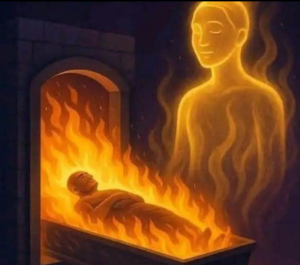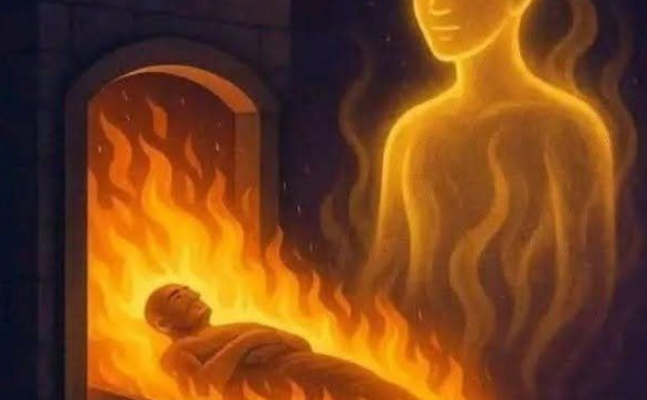The Sin of Cremation? A Biblical Reflection on Fire, Flesh, and Faith
The image of a soul rising from a burning body evokes powerful emotions—grief, transcendence, and mystery. In many cultures, cremation is a sacred rite, a final act of purification. Yet within the Christian tradition, especially among those who hold tightly to biblical authority, cremation has long stirred debate. Is it a sin? Or is it simply a cultural choice, misunderstood through the lens of ancient customs?
🔥 Biblical Silence and Cultural Practice
The Bible does not explicitly condemn cremation. In fact, it is largely silent on the matter. Burial was the dominant practice among the Israelites, as seen in the deaths of Abraham, Sarah, Isaac, Jacob, and even Jesus himself (Genesis 23:19; John 19:41–42). These burials were acts of reverence, often accompanied by mourning rituals and tombs that signified honor.
However, silence is not prohibition. The absence of a command against cremation suggests that the issue is not doctrinally central. In 1 Samuel 31:11–13, the bodies of Saul and his sons were burned by the men of Jabesh Gilead after being desecrated by the Philistines. Their bones were then buried. This act, though unusual, was not condemned. It may have been a gesture of honor in the face of humiliation.
🕊️ Theological Concerns: Resurrection and the Body
One of the strongest objections to cremation among Christians stems from the doctrine of bodily resurrection. Paul writes in 1 Corinthians 15:42–44 that the body is “sown in corruption” and “raised in incorruption.” The resurrection is not a reanimation of decayed flesh but a transformation into a glorified body. Philippians 3:21 affirms that Christ “will transform our lowly bodies so that they will be like his glorious body.”
Some argue that cremation disrupts this process. But this concern overlooks the omnipotence of God. Whether a body is buried, burned, lost at sea, or decomposed over centuries, the Creator who formed man from dust (Genesis 2:7) can surely resurrect him from it. As Billy Graham once said, “At the resurrection it will not make any difference whether a person’s body has been buried or cremated. God knows how to raise the body”.
⚖️ Respect for the Body: Symbolism and Sentiment
The body, in Christian thought, is not merely a vessel—it is a temple (1 Corinthians 6:19). Even in death, many believe it deserves dignity. Burial, with its slow return to the earth, mirrors the biblical phrase “dust to dust” (Genesis 3:19). Cremation, by contrast, is immediate and fiery. For some, this evokes judgment rather than peace.
Yet others see cremation as a form of purification. Fire, in Scripture, is not only destructive—it is refining. Malachi 3:2 speaks of God as a “refiner’s fire.” The burning of the body may symbolize the soul’s release, a shedding of earthly ties. In this view, cremation is not desecration but transformation.
🧭 Historical Shifts and Modern Realities
Historically, cremation was rare among Jews and early Christians. It was associated with pagan rituals, especially in Roman and Greek societies. Over time, Christian burial became a symbol of hope in resurrection. The rejection of cremation was less theological and more cultural—a way to distinguish Christian identity.
Today, cremation is increasingly common. In the U.S., nearly half of all funerals involve cremation. Cost, environmental concerns, and personal preference play major roles. For many believers, the choice is not about sin but stewardship.
🧠 Conscience and Conviction
Romans 14 offers a guiding principle: “Let each be fully convinced in his own mind.” Paul urges believers not to judge one another over disputable matters. If cremation violates one’s conscience, it should be avoided. But if it is chosen with reverence and faith, it need not be condemned.
The real question is not whether cremation is sinful, but whether it reflects the values of the person and their faith community. Does it honor the deceased? Does it express hope in resurrection? Does it bring peace to the living?
🌌 The Soul’s Journey: Beyond Flesh and Flame
The image you shared—a soul rising from a burning body—is deeply symbolic. It captures the essence of Christian hope: that death is not the end. Whether the body is buried or burned, the soul journeys onward. Ecclesiastes 12:7 says, “The dust returns to the ground it came from, and the spirit returns to God who gave it.”
In this light, cremation is not a sin but a symbol. It is a choice that must be made with care, not fear. The fire may consume the flesh, but it cannot touch the soul.


